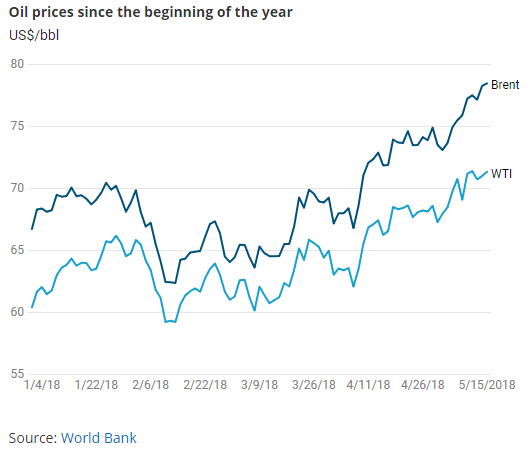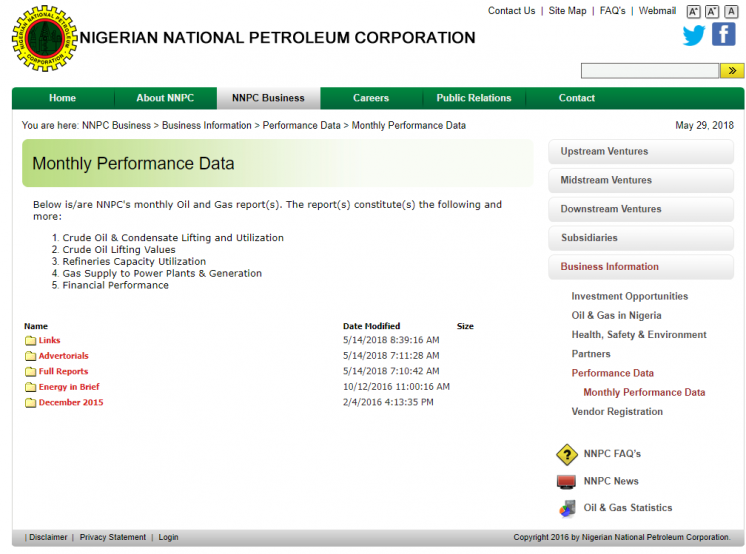
NEITI calls for a joint effort to avoid mistakes from the past
NEITI calls for a joint effort to avoid mistakes from the past
As oil prices reach 2014 levels, Nigerians wonder whether they are better placed to take advantage of future commodity booms.
The fall in commodity prices impeded growth in African countries, decelerating the pace of economic expansion in the continent to levels not seen since 2009. Higher oil prices are expected to provide some respite, and on 24 May Nigeria announced the first transfer of funds to the Excess Crude Account (ECA), the country’s savings account, since the country went into recession in 2016. For some observers however, higher commodity prices by themselves will not be enough to drive Nigeria’s economy without important reforms.

Table 1: http://blogs.worldbank.org/developmenttalk/why-commodity-prices-are-rising-nine-charts
“The fall in oil price was not the sole culprit for our current economic troubles”, said Waziri Adio, NEITI’s Executive Director, in a 2016 speech during the worst of the commodity price slump. “The fall in prices was only an inevitable trigger”. As oil prices hover around USD 80 per barrel, NEITI is again calling for a joint effort to avoid mistakes from the past. “We have been highlighting gaps in the management of Nigeria’s oil and gas for over a decade. Can we really say that Nigerians are better off as a result? We assume that transparency will lead to public engagement which in turn will lead to more accountability, but is this really true? A more proactive approach is needed from all of us if we are collectively to avoid the mistakes of the past. We need to think about how to ensure that increased access to information leads to meaningful reforms”.
One such reform currently underway is the Petroleum Industry Governance Bill (PIGB) awaiting final reconciliation before it can be signed into law. According to a recent study by NEITI, delays in passing an over-arching law for the petroleum sector have cost Nigeria an estimated USD 200b in loss of investment, possible returns on investment, and losses due to unclear fiscal terms and non-resolution of host community issues. NEITI has also argued that Nigeria should reform the ECA to reduce the effects of price volatility in commodities and to save more of the oil and gas revenues for future generations.
Addressing governance challenges in the Nigerian National Petroleum Corporation (NNPC) is another pending challenge. A study published by NEITI in March 2018 found that NNPC and its upstream arm, the Nigeria Petroleum Development Corporation (NPDC) had failed to remit some USD 21.8b to the Federation account as of 2015, the latest year reviewed by NEITI in its EITI reports. Nevertheless, there are signs that things are improving. At a recent workshop in Abuja, NNPC’s Group General Manager, Crude Oil Marketing Division, Mele Kyari said “[NNPC has] re-enforced auditing of our operations including third party and the direct sale of crude oil to refineries, reputable traders, upstream companies and Nigerian entities”. Kyari added that there was a marked difference from the past, saying “we have not [previously] had the opportunity to put our cards on the table as we have in the last two years”. Speaking at the same event, Masami Kojima of the World Bank echoed some of these sentiments, noting “NNPC has made ‘shining the light’ one of the five objectives in its reform program, 20 Fixes. To that end, it has been publishing monthly financial and operations reports with more details than ever before.” Commenting that much work remains, she added, “NEITI can play an important role in promoting even greater transparency by providing independent assessment and analysis, as it does in its policy papers.”

Table 2: NNPC regularly publishes monthly information on the performance of the oil and gas sector, see http://nnpcgroup.com/NNPCBusiness/BusinessInformation/PerformanceData/MonthlyPerformanceData.aspx.
According to Kolawole Banwo, Programme Manager at CISLAC and Head of NEITI’s Civil Society Steering Committee, “the question remains whether the PIGB and NNPC’s reforms will be followed through and whether this will help ensure that Nigeria makes the most of the current upswing in commodity prices. NEITI and civil society have an important role to play in supporting these efforts, but the responsibility belongs to all Nigerians”.
Nigeria was one of the first countries in the world to implement the EITI. In Nigeria the EITI is implemented by NEITI, a government agency with a broad mandate under the NEITI act, and the National Stakeholder Working Group, a multi-stakeholder group that serves as its governing body.
For further information about the EITI in Nigeria, please visit the country page on the EITI website and their national EITI website. They also have a facebook page.



